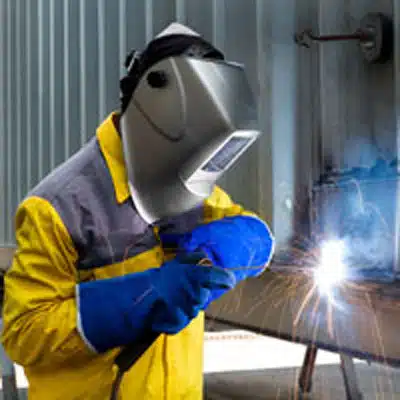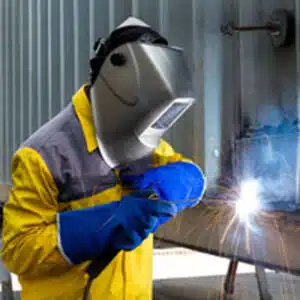Any worker who handles metal parts, works in extreme heat, or uses electricity places themselves at a higher risk for a workplace injury. Those working in the welding profession perform all three of those tasks daily. By understanding the most common causes of welding accidents, welders can take the necessary steps to protect themselves from serious workplace injuries.
Electrical Shock
One of the most common causes of welding accidents is electrical shock. When metal pieces containing electrical voltage touch, their electrical circuit can cause primary or secondary voltage shock. Without proper grounding, these shocks can enter a welder’s body. Electrical shock can result in first and second-degree burns. Using proper grounding equipment and following safe work practices can prevent electrical accidents.
Toxic Exposure
The welding process often produces toxic fumes that can be dangerous to workers who breathe these dangerous gases into their lungs daily. Welding fumes can contain harmful chemical byproducts, including lead, manganese, aluminum, carbon monoxide, carbon dioxide, and arsenic. Toxic exposure to metal oxide compounds can lead to the development of respiratory illnesses and lung cancer. To avoid injuries caused by toxic exposure, welders should work in ventilated areas with properly maintained equipment.
Welder’s Flash
Also called arc eye, welder’s flash occurs when a welder is exposed to a bright flash of ultraviolet light coming from a welding torch. Welder’s flash typically causes inflammation of the cornea and can lead to light insensitivity, blurred vision, infection, and even loss of eyesight. Workers can protect themselves from flash burn by wearing coated safety googles, a welder’s mask, or specially designed sunglasses.
Hearing Loss
Noise pollution is another potential cause of welding-related injuries. The average welding working environment produces over 85 decibels of noise. Without proper ear protection, welders risk significant hearing loss or damage to the ear canal.
High Temperatures
High temperatures produced by the welding arc can contribute to dangerous working conditions. Welders face significant burn risks from fire given the necessary high temperatures and amount of chemicals involved in the welding process. Molten metal and hot slags also present significant burn risks. Hot sparks and flying metal pieces can present an additional safety risk for workers. Debris landing in a welder’s eye or penetrating the ear canal can cause irreparable damage affecting the welder’s vision or hearing for the rest of their lives.
Compensation for Injured Workers
Welding accidents can result in serious injuries requiring years of medical treatment and result in an ability to return to work. Significant medical expenses and lost wages can place great financial stress on families caring for an injured worker. Employers who fail to provide a safe working environment for their workers may face liability when a workplace injury takes place. The first step in determining whether compensation may be available for a workplace injury is to contact an experienced Wilmington work accident lawyer to discuss your case.
Wilmington Work Accident Lawyers at Rhoades & Morrow Assist Workers Injured in Welding Accidents
If you or a loved one has suffered injuries in a welding accident, the experienced Wilmington work accident lawyers at Rhoades & Morrow can help you receive the maximum amount of compensation for your injuries. Our offices are conveniently located in Wilmington, Bear, and Milford, Delaware to serve work accidents victims throughout the state, including the areas of Elsmere and Seaford. To schedule a free consultation today, call us at (302) 427-9500 or submit an online inquiry form.





